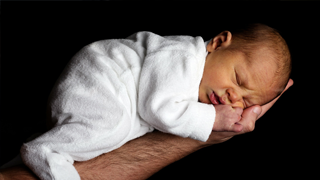NHS treats couple as ‘annoyance’ after refusing abortion

A couple have claimed that they were 'steered towards' abortion by the NHS after their baby was diagnosed with Down's Syndrome just three weeks before the due date. Regan King explains how this is just one of many cases where abortion discriminates against those with disabilities.
Couple steered towards abortion
A couple have claimed they felt ‘steered towards an abortion’ from the outset of their Down’s syndrome diagnosis at 37 weeks – 3 weeks before the child was born.
This week the Daily Mail reported on the tragic story of Hannah, Ben and Iris Day. Conceived through IVF, Hannah’s pregnancy seemed to be going smoothly up until the 36th week when Iris was discovered to have a heart problem, Atrioventricular septal defect (AVSD) in which numerous holes exist in the heart’s internal walls. This led to a diagnosis of Down’s syndrome in the 37th week.
At this point, it seems the assumption made by medics was that the Days would desire to end the life of their baby. This was simply because it had Down’s syndrome which is commonly accompanied by the surgically correctable AVSD. Upon their refusal to abort the child, the Days felt they were treated as an ‘annoyance to the NHS’ and all information they were given about Down’s syndrome and having an affected child was very negative. One doctor even abruptly told the couple: ‘Your child will be mentally retarded’.
Despite NHS professionals’ best efforts to influence the Days to have an abortion, baby Iris was born three weeks after her initial diagnosis. Sadly, Iris died 5 months after birth after what appears to be a catalogue of NHS failures to prioritise the much-needed heart surgery to correct Iris’ AVSD. The Days never sensed any urgency on the part of medical professionals to ensure that Iris received the treatment she most needed.
Abortion’s disability discrimination
The treatment of Hannah, Ben and Iris Day should come as no surprise. Disability is a ground for abortion under the Abortion Act (1967) and while the normal term limit is 24 weeks, there is no term limit when foetal abnormalities are detected. Last year, 706 babies were aborted in England and Wales solely because they were diagnosed with Down’s syndrome. With the latest non-invasive prenatal testing (NIPT), the abortion rate for children with Down’s syndrome has risen and continues to rise.
In her moving 2016 documentary, ‘A World Without Down’s Syndrome’, actress Sally Phillips – herself a mother of a child with Down’s – asks ‘What’s so dreadful to the world about Down’s Syndrome?’ One medical professional spoke to Phillips of the years that people with Down’s syndrome will live saying they may be ‘A burden that will last a very long time.’ A main concern for Phillips is that NIPT will screen people with Down’s out of society – as though Down’s is a disease to eradicate.
Following the documentary Hadley Freeman asserted in The Guardian:
“Phillips’ inference that screening will lead to babies with Down’s syndrome not “being allowed” to live in this society is dishonest.”
It is this statement, in fact, that is dishonest. Statistics show that where Down’s syndrome has been discovered in prenatal screening over 90% choose to abort the child. In Iceland almost 100% of children screened for Down’s Syndrome are aborted.
Parliamentary activity
Debates in Parliament continue to hint at another attempt by some MPs to decriminalise abortion, which would potentially allow mothers to end babies’ lives in the womb for any reason at any time up to birth. This will only serve to increase terminations of children with developmental abnormalities.
While discussions of decriminalisation continue, Birmingham Council became the latest council to express support for free speech threatening ‘buffer zones’ around abortion clinics. If implemented buffer zones would ban pro-life groups from offering prayer and counsel to women entering abortion clinics who may desire to keep their child. The Home Affairs Committee will be examining evidence from pro-life groups on 12 December in Westminster.
Meanwhile, Lord Shinkwin’s Abortion (Disability Equality) Bill calling for provision for disability equality and balanced information in respect of abortions awaits its second reading in the House of Lords. Lord Shinkwin, a Peer in the House of Lords who was born with a rare genetic brittle bone disease has spoken of Britain's abortion laws as "a licence to kill for the crime of being disabled".
Were Lord Shinkwin’s Bill to pass, it would be a massive step forward in acknowledging the pre-born child’s right to life and the equal humanity of the disabled.
We should pray to that end.
